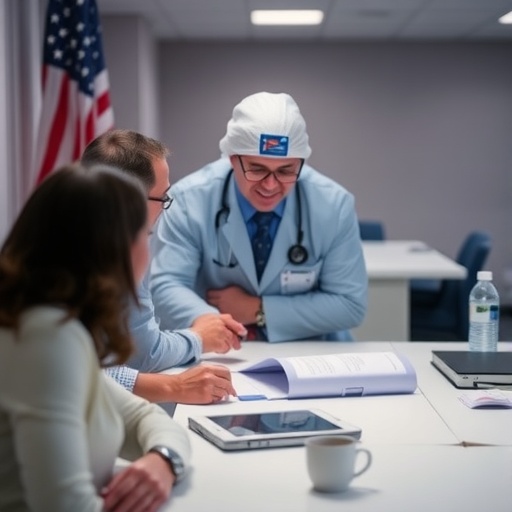In an increasingly complex healthcare landscape, the demand for innovative educational approaches is ever-growing. A recent study sheds light on a novel transdisciplinary clinical immersion course aimed at enhancing the understanding of needs identification in veteran and service member healthcare settings. This research, conducted by a team of dedicated scholars, delves into the experiences of students engaged in the program, providing invaluable insights that could potentially reshape how emerging healthcare professionals are trained.
The course was meticulously designed to break down traditional disciplinary silos, encouraging collaboration across various fields, including medicine, engineering, social work, and public health. This integration allows students to appreciate the multifaceted nature of healthcare challenges faced by veterans and service members. By immersing students in real-life scenarios, the course aims to foster a deeper understanding of the specific needs of these populations, which often go unaddressed in conventional training.
Students participating in the program were involved directly with veterans and service members, enabling them to witness firsthand the diverse and complex healthcare challenges these individuals encounter. This hands-on experience is crucial in translating theoretical knowledge into practical solutions. The research highlights how this experiential learning fosters empathy and equips students with the tools to navigate the nuanced healthcare landscape for this demographic.
The study utilized qualitative methods to collect data on student experiences, focusing on their reflections and insights gained throughout the course. This narrative approach allows for a rich exploration of personal experiences, revealing the profound impact that immersive education can have on students’ perspectives. Participants reported an increased awareness of the unique issues faced by veterans, including PTSD, substance abuse, and access to care, which are critical factors that healthcare professionals must understand to provide effective support.
Moreover, the course emphasizes the importance of collaboration and teamwork. Students often work in interdisciplinary groups, simulating a real-world healthcare environment where professionals from different fields must collaborate to address complex health issues. This aspect of the course is particularly beneficial, as it mirrors the collaborative work that students will encounter in their professional lives, ultimately enhancing their employability and readiness for the workforce.
The feedback collected from participants also underscores the transformative nature of the course. Many students expressed that their preconceptions about veteran care changed significantly after participating in the program. The opportunity to engage directly with veterans and service members brought a level of authenticity and urgency to their learning experiences, reinforcing the importance of addressing the unique healthcare needs of this community.
In addition to student growth, the transdisciplinary nature of the course serves to benefit the healthcare system at large. By equipping future healthcare providers with a comprehensive understanding of the needs of veterans and service members, the course contributes to the development of more effective strategies and interventions. These future practitioners may carry this knowledge into their careers, promoting a healthcare environment that is more attuned to the complexities faced by this population.
Furthermore, the study illuminates the potential for similar educational models to be applied in various contexts beyond veteran healthcare. Other areas of public health, such as mental health, chronic disease management, and community health initiatives, can benefit from a transdisciplinary approach. This highlights a critical opportunity for educational institutions to broaden their curricula, fostering a generation of healthcare providers who are better equipped to meet the challenges of diverse patient populations.
As healthcare continues to evolve, the lessons learned from this transdisciplinary approach could play a pivotal role in shaping future educational frameworks. It encourages a shift from traditional, isolated disciplines toward a more integrated model that promotes collaboration and holistic understanding of patient care. The implications reach far beyond the classroom, potentially influencing healthcare policy and practice on a national scale.
The overarching theme of the study speaks to the necessity of adaptability in healthcare education. In an era marked by rapid change and increasing complexity, it is essential that educational institutions remain responsive to emerging needs. Transdisciplinary courses like this one represent a crucial step toward creating a workforce that is not only knowledgeable but also compassionate and capable of innovative problem-solving.
Reflecting on the experiences gathered from this research, it becomes clear that the path to effective healthcare for veterans and service members is paved with understanding, empathy, and collaboration. As the findings from this study circulate within academic circles, they may ignite conversations about the future of healthcare education and inspire similar initiatives designed to empower students and improve patient outcomes.
In conclusion, the transdisciplinary clinical immersion course studied provides a compelling case for the integration of hands-on experiences in healthcare education. It exemplifies the potential of immersive learning to foster not only technical skills but also the empathy and understanding necessary for addressing the unique challenges faced by veterans and service members in healthcare settings. By bridging the gap between theory and practice, this educational approach holds the promise of creating a new generation of healthcare providers prepared to meet the needs of all patients, particularly those who have served their country.
As stakeholders in the education and healthcare sectors continue to explore innovative models for training, the lessons learned from this study pave the way for a future where healthcare professionals are not only equipped with knowledge but are also advocates for holistic, patient-centered care. It is through such initiatives that we can hope to see lasting change in the healthcare experiences of our veterans and service members.
Subject of Research: Transdisciplinary clinical immersion course on veteran and service member healthcare.
Article Title: Exploring Student Experiences in a Transdisciplinary Clinical Immersion Course on Needs Identification in Veteran and Service Member Healthcare Settings.
Article References:
Scheerer, S., Tenembaum, C., Lee, A.M. et al. Exploring Student Experiences in a Transdisciplinary Clinical Immersion Course on Needs Identification in Veteran and Service Member Healthcare Settings. Biomed Eng Education (2025). https://doi.org/10.1007/s43683-025-00201-w
Image Credits: AI Generated
DOI: https://doi.org/10.1007/s43683-025-00201-w
Keywords: transdisciplinary, healthcare education, veterans, clinical immersion, student experiences, needs identification.




